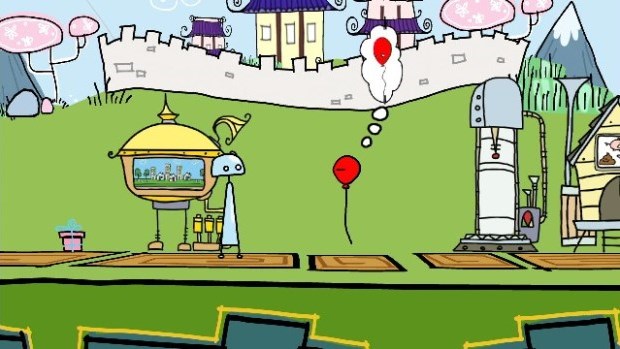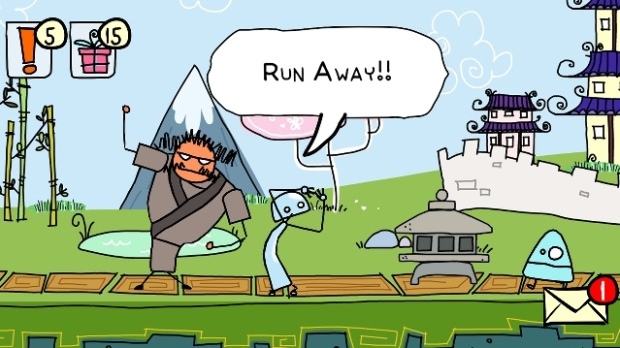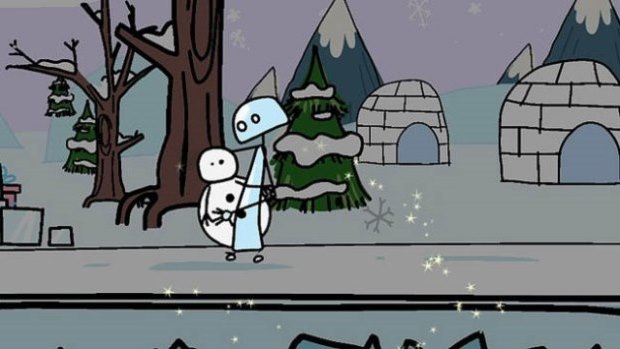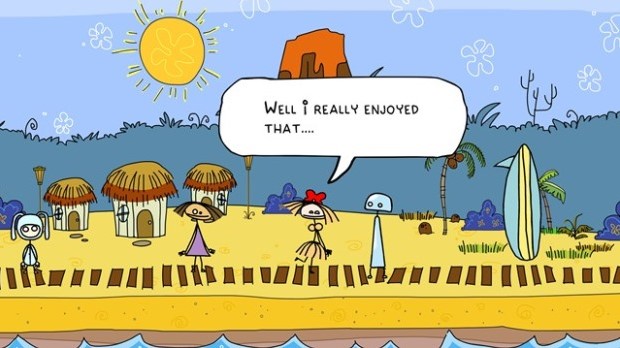Doki-Doki Universe Review
The concept of a robot attempting to understand what it feels like to be human is something that has been explored extensively in film and literature, and this Pinocchio-esque aspiration to get under the skin of us flesh-bags is what drives QT3, the nuts and bolts star of the aptly named Humanature Studios’ charming new game. This is an experience that eschews violence and bombast and concentrates on allowing you do things to make others feel good. The use of doki-doki, the sound-symbolic Japanese phrase for “with a throbbing heart”, could not possibly be any more appropriate.
QT3 is whisked away from his lonely asteroid bolt-hole by the splendidly-monikered Alien Jeff, who informs him that his model is under threat of being scrapped due to the fact that he is unable to effectively understand the human condition. Rather than accept his fate as molten metal, QT3 sets out on a journey with the flying saucer-riding Jeff around a wonderfully realised, spectacularly diverse cosmos, visiting planets where he interacts with humans and many other anthropomorphic beings to learn what life is all about.

Each planet you visit will have a number of tasks to complete, and a set number of presents. Some of these gifts are hidden in the scenery and can be found very easily simply by moving background objects with your finger to reveal their whereabouts. Other presents are unlocked by your interactions with characters or by helping them with their myriad problems.
Helping people usually involves speaking with them to ascertain the issue, and then finding an object to fulfil their desire or solve their problem. This is achieved using QT3’s ability to use “Summonables”. The items you pick up in present form are transferred into bubbles for later use. You are then able to conjure forth the contents of any bubble when speaking to another character, in the hope that it will be the answer to their dilemma. So when a girl you meet complains of being thirsty, summoning a water cooler will tick that task off your list. It isn’t always entirely clear what each item actually is, or how it should be used, so some lateral thinking often needs to be applied, however the game seldom punishes you for getting things wrong – even summoning something wildly inappropriate can be put right one way or another.

Every other person you come across has their own specific identity card, and by speaking to them and the other characters in the vicinity you can learn what their “likes” and “hates” are. Each individual responds well to being greeted in a certain way, too. QT3 can bow, wave, or blow kisses – and it is specified on each identity card how someone prefers to be met. By summoning things that someone likes, or indeed hates, or giving them a well-timed wave, you can successfully obtain information or presents. QT3 can also pick characters up or trigger earthquakes that can also have an effect on how people carry on. Some characters will love being picked up and pounded into the ground. Others may be impressed by your seismic rumble ability, even if its inclusion does seem a bit tacked-on.
Things don’t deviate from the fetch-and-carry formula, and every planet you visit will require the same approach – find all of the hidden presents first, speak to all of the characters, and meticulously solve their problems one by one. It may sound incredibly boring, and in many ways QT3 is extremely put-upon by the residents of this Doki-Doki galaxy, but the game urges you forward with its brilliant use of visual humour, great-looking cartoon locations and a rogue’s gallery of genuinely hilarious characters. You will never tire of the sight gags and wonderful cartoon drawings, which delight time and time again.

A huge green dragon is upset that he doesn’t have an heir, and asks you to find him a baby dragon. Cue a thought bubble that shows a human woman feeding a baby dragon perched in a high-chair. Move forward a few yards and then you come across what looks like a moving, talking Stonhenge monument, which is exactly that – and even named Stonehenge! There are flying guinea pigs, talking cocktails with faces, and about a billion other utterly brilliant, kooky goings on.
Secondary to the main crux of the title is a built-in psychological test. This may sound a little sinister, but is actually a wonderful way of lending a bit of individuality to each playthrough. Along the way you can undertake small, frequent personality tests. You will be asked for your interpretation of a picture, for example, and your answers will be analysed by in-game psychoanalyst Dr Therapist, to determine what kind of personality you have. All of this is, of course, about as accurate as you would expect from an oddball video game, yet the game world is so much richer for its inclusion.

However, there are a few technical niggles. Doki-Doki Universe is the first cross platform game to support all three current Sony consoles. The Vita version makes the most sense – using a touch screen would ostensibly be the best way to carry out QT3’s mission, but there are issues: the inaccurate rear touch-pad that never seems to pick up the correct gesture when you are greeting someone, jerky framerate when there is lots going on on-screen, and the slooooow loading times. The PS3 version has no control cock-ups, yet seems somewhat unstable and frequently freezes up. The PS4 version offers your best way to play, with stable performance and smoother framerate, according to reports.
VERDICT: Helping people out has never been more heart-warming and funny in a video game. This is another gentle, feel-good indie release that provides a most enjoyable alternative to blasting people or taking in a high definition sports match. It is the sort of release that makes you realise why you love playing games in the first place – to be transported to a crazy, otherworldly place to help a loveable robot do his good work. It’s simple and isn’t incredibly difficult to beat, but it will be almost impossible to forget.

VERY GOOD. An 8/10 is only awarded to a game we consider truly worthy of your hard-earned cash. This game is only held back by a smattering of minor or middling issues and comes highly recommended.
Review code provided by publisher.





